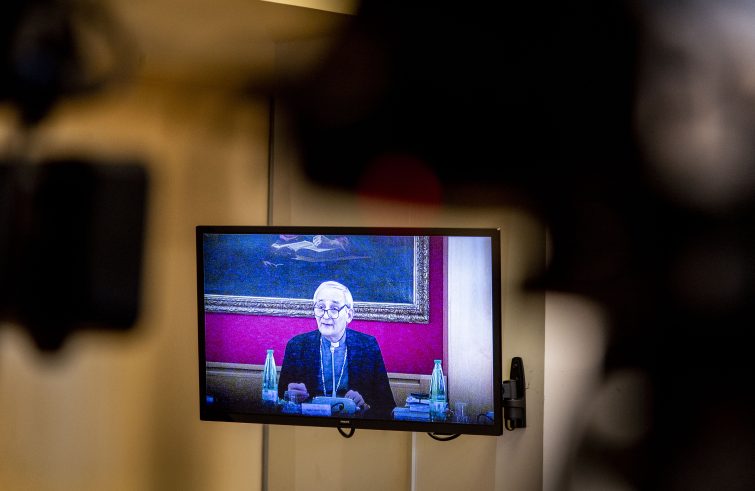
“The Church presents herself as she is: without arrogance but aware of her unique mission, to the Italian people, to local and national institutions, to the various members of cultural, social and political life”, said Cardinal Matteo Zuppi, archbishop of Bologna, president of the Italian Bishops’ Conference (CEI), in his opening address at the Italian Bishops’ Standing Committee meeting, underway in Rome until 24 January.
“Peace is what mankind needs most today”,
the Cardinal said. “Looking at the international context, we cannot but express our grave concern at the escalation of hatred and violence that is sowing death and destruction in Ukraine, in the Middle East and in many other parts of the world,” was Zuppi’s cry of alarm: “The sound of guns is deafening. The scourge of war is spreading, society is addicted to pain, and those who speak of peace seem to be crying out in the wilderness. Does this mean that we must resign ourselves? Never!”
“Building peace is indeed the duty of the world powers, but it is a task for each and every one of us”,
said the President of the Italian Bishops’ Conference. “We must not tire of invoking the gift of peace, of educating ourselves for peace, starting from our homes, our families, our communities”, he urged: “Our Churches must banish the language of discord and division, they must have words of peace, inviting the faithful to cultivate thoughts and feelings of peace.”
“Let us not leave the Holy Father alone in the ministry of peace”,
he said: “His prophecy is a unique value for humanity. We, the Italian Bishops, cannot and do not want to leave him alone. We are bound to him not only by geographical proximity, but also by a special historical and spiritual closeness.” “It is in this spirit, aware of the privileged relationship that binds our Church to the Pope, that we are living the ad limina visit starting today,” the Cardinal announced.
Cardinal Zuppi commented on the Dicastery for the Doctrine of the Faith’s recent Declaration Fiducia Supplicans, which opens up the possibility of blessing same-sex couples:
“Without departing from the teaching of the Magisterium, this document is set within the horizon of mercy, of the Church’s loving gaze towards all the children of God.”
In fact, as the Presentation makes clear, “the importance of the Sacrament of Marriage is not called into question,” he pointed out, referring to the presentation of the document and recalling the recent article by His Eminence Cardinal Betori, published in the Italian newspaper Avvenire, in which the archbishop of Florence pointed out that “blessings are a pastoral resource and not a risk or a problem”, a gesture “that does not aspire to sanction or legitimise anything”, whereby “the faithful can experience the closeness of the Father.” “At a time when the international community is fragmented, when nationalisms and ethnicities are rife, when supranational organisations are struggling to serve as anchors for global orientation, as is sadly the case with the United Nations,” he said in his opening lines, which were devoted to political issues, “the European Union needs greater cohesion and capacity to take action in the face of ongoing conflicts and the promotion of peace, as well as in other delicate scenarios, such as demographic dynamics, climate change, the protection of fundamental rights, social justice in the face of widespread poverty, and international cooperation”:
“We need to cultivate the soul of Europe, to rediscover its historical foundations and values, also in view of the forthcoming renewal of the European Parliament.”
“The Church, even with her limitations, is a great gift for us and for the humanity of Italians”, the underlying certainty: “Let us not be intimidated by purely sociological interpretations of the Church! Let us not allow ourselves to be intimidated by a culture where faith is in a state of decline! It is the arrogance of pessimism masquerading as realism! Let us not be intimidated by readings of the Church that misinterpret our actions as political. We are open to dialogue, but we will not allow others to dictate the content of our charitable action or our mission, which is never partisan, because the only part of the Church is Christ and the defence of the human person, of life, from its beginning to its natural end.”
“Some accounts are aimed at dividing bishops and Christians, whereas I perceive a deep communion between bishops and the people, and this is more valuable than social media ‘Likes’,
the Cardinal remarked. “The social question is always also a moral and – I dare say – a spiritual question,” he said, referring to the structure of our society in which “inequalities have increased and poverty has become virtually entrenched”: “This is evident in access to basic services such as food, health care and medicine, and education, especially higher education. The malaise of the poor, which creates pockets of harmful deprivation, also stems from the realisation that there is no longer a social ladder from which to dream of improvement.” “Equal opportunities for all include the commitment to eliminate gender inequality,” Cardinal Zuppi pointed out:
“It is unacceptable for women to be paid less on average than men for the same job.”
More generally, “in Italy we have a problem regarding the recognition of people’s dignity and work – poorly paid as a result of precarious contracts and the exploitation of workers.” Another issue “crucial for the future of the Church and society” is the care of young people, “who are the present of our communities.”











